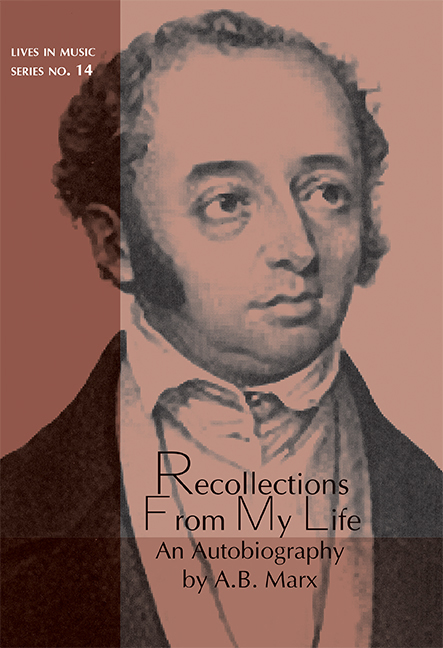Book contents
- Frontmatter
- Contents
- Introduction
- Select Bibliography
- Contents of Volume One
- 1 My Father's House
- 2 Musical Beginnings
- 3 War
- 4 Starting with Composition and Theory
- 5 The Theater in Weimar
- 6 War, again
- 7 The University
- 8 Early incentives for the practice of law
- 9 Legal practitioners
- 10 From Halle to Naumburg
- 11 To Berlin
- 12 Berlin
- 13 Fata Morgana
- 14 Personal relationships
- 15 The Berlin Opera at its height
- 16 Spontini
- Contents of Volume Two
- Afterword in place of foreword
- Translator's Note on Indexing
16 - Spontini
from Contents of Volume One
- Frontmatter
- Contents
- Introduction
- Select Bibliography
- Contents of Volume One
- 1 My Father's House
- 2 Musical Beginnings
- 3 War
- 4 Starting with Composition and Theory
- 5 The Theater in Weimar
- 6 War, again
- 7 The University
- 8 Early incentives for the practice of law
- 9 Legal practitioners
- 10 From Halle to Naumburg
- 11 To Berlin
- 12 Berlin
- 13 Fata Morgana
- 14 Personal relationships
- 15 The Berlin Opera at its height
- 16 Spontini
- Contents of Volume Two
- Afterword in place of foreword
- Translator's Note on Indexing
Summary
At the pinnacle of opera at that time was the Italian Gaspardo [sic] Spontini. With him, the fickleness of fortune became visible for the first time for me. Within a short span of time I would be witness of the most extravagant admiration and the most shameful denigration, both from the very same persons, heaped upon the very same head, with irrepressible excitement. Is it possible for such fiery enthusiasm, if it is authentic, to change into such irate criticism? For the first time I could really see the meaning of the fateful tag-line of the Berliners: “Man so duhnP. The jubilation with they had so often greeted Spontini, had been no real enthusiasm, no enduring glow of amazement and love, like that which discerning spirits offer to the leading spirit; it was the straw-fire of fleeting excitement, which quickly flares up and just as quickly chokes to death in thick smoke. At that time no voice was raised in complaint; I myself had used my words and my name in favor of Spontini. A quarter of a century, and more, has flowed by since those events; everyone can know look back upon them calmly - — and the deceased can at least have the last word on the matter: his recognition, what he was, and what he provided Berlin. More than many, I think that I, from the beginning to the end enjoyed and could boast of his friendship and his artistic assistance.
I mentioned above that Spontini was at the pinnacle of the opera. The peak of the opera and Spontini's activity was Carnival time. Here opera was foremost. Next to those of Mozart and Beethoven there were, as said above, the musical works of Gluck and Cherubini, but more favored than all the rest, by the number of performances, were those of Spontini. These were the real festival operas, which — namely in Nurmahal, Alcindor, Agnes von Hohenstaufen, proper court operas - opened the court festivities to the broader public.
- Type
- Chapter
- Information
- Recollections From My LifeAn Autobiography by A. B. Marx, pp. 97 - 114Publisher: Boydell & BrewerPrint publication year: 2017



